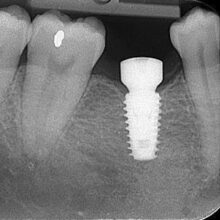
What are Dental Implants?
A dental implant is an artificial tooth placed into the jawbone for replacing the root of a tooth. Being made of biocompatible titanium, they blend in with your natural teeth and are an ideal option for people who have lost their teeth due to an injury, gum disease or other reasons.
They are a long- term solution for restoring your smile. If you care for the implants and your teeth properly, they will last you a lifetime!
Dental Implant restorations have 3 parts:
- Titanium bone- integrated implant, which mimics a tooth root.
- Implant porcelain crown, which is the visible part of the tooth, matching the rest of your natural teeth.
- Implant abutment, which connects the two together.





Benefits of Dental Implants
Several studies have proved that implant have a success rate of over 90% and can last many years or even a lifetime with proper oral hygiene.
- Compared to a dental bridge, they do not require removal of healthy tooth structure of the adjacent teeth, thereby reducing the risk of decay or root canal treatment over time. Also, can be easier to clean than a bridge.
- Dental implants restore the bite and contact with other teeth which makes chewing feel natural.
- Improves a person’s confidence, because there is no fear of something getting dislodged out of the mouth (i.e. removable dentures), while speaking or chewing.
- Most importantly, is the ability of it to stimulate bone growth. The natural tooth root promotes bone growth and with its removal, the bone starts to shrink. The dental implant mimics the tooth root, thereby stimulating the bone to grow.
Dental Implant procedure
The procedure is simple but requires a few visits to complete. The procedure is routinely carried out under local anaesthetic; many patients report that it is easier than having a tooth extracted!
1. Evaluation
First, we need to determine if you are a right candidate for dental implants. To do this, we take impressions, photos, x-rays, CT scans. This will give us information about your bone quality, volume and shape.
2. Treatment
Once you are numb, our dentist will surgically place the implant into the jawbone. The implant will need 3-6 months to heal, during which osseointegration will take place where there is a connection between the jawbone and the implant.
The abutment is positioned to connect the implant and the crown. The abutment is a connection that spans through the gum line, so the implant remains buried.
3. Final Restoration
Once healing is completed, a customised crown will be placed, which blends with the rest of your teeth, giving you back your ability to eat chew properly and making you feel more confident.
Possible Complications
With technological advancement, having surgery these days is safer than ever. But there is still a small risk associated with dental implant procedure. Most common ones are:
- Infection in the implant site.
- Sinus problems caused by implant intrusion into the sinus areas.
- Nerve damage, which can cause tingling or numbness in parts of the mouth and face.
- Injury to other parts of the mouth such as blood vessels, bone or adjacent teeth.
Post Op care
Follow these instructions to ensure good and complication- free healing:
- Rest at home after surgery.
- Refrain from exercise.
- No alcoholic drinks for 48 hours after surgery or whilst on antibiotics.
- Do not smoke for at least 48 hours post-surgery.
- Avoid hard or crunchy foods and drink lots of fluids.
- Use icepacks to reduce swelling.

Enquiries will be responded via Phone Only
Our Opening Hours Are: 8:30am-5:30pm, Monday To Friday and by appointment only On Saturday.
"*" indicates required fields
white cross hornsby dental / CBHS




